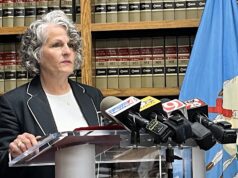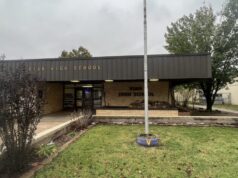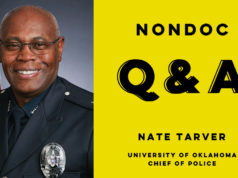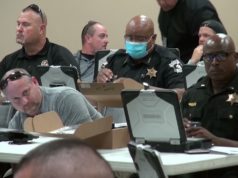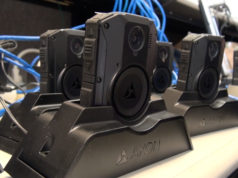

The president of Oklahoma City’s police union has told NonDoc that an agreement allowing for the reimplementation of OKCPD body cameras could be reached as early as the end of August.
Activists and city officials would like to see a resolution to the union’s dispute with the department even earlier.
While the Fraternal Order of Police and the City of Oklahoma City are negotiating their annual contract, body-camera policy has been a sticking point between the union and the department since previous discussions stalled in 2015.
The city went ahead and implemented the cameras anyway in late January, despite protest from the union. An arbitrator ruled June 14 that the program had to be suspended while a final policy was negotiated.
“We’re hoping we can get them back out there pretty quick,” said OKC FOP president John George. “We’re waiting for some numbers from the insurance companies because the cost of insurance is part of our contract. That usually gets here in the middle of August. That’ll kind of be the last unknown factor. So, if things go smoothly, not too long after that.”
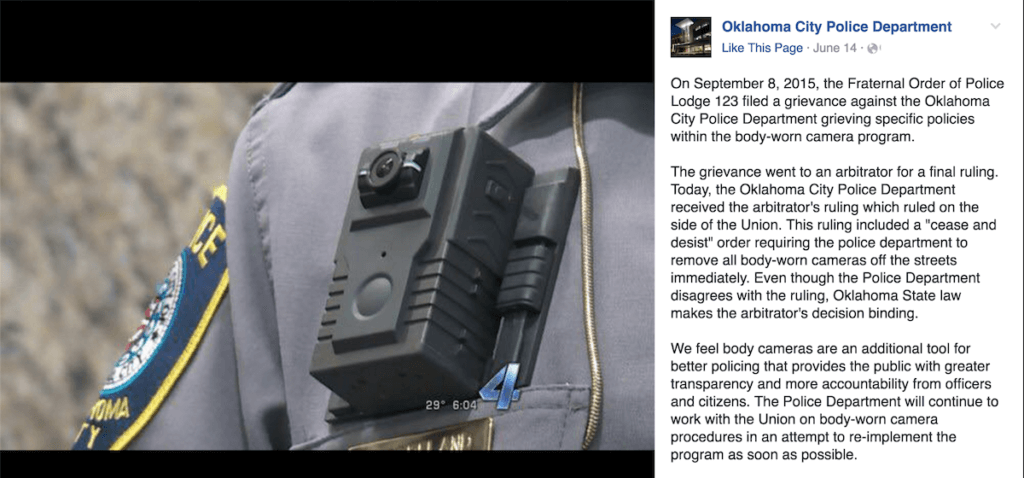
The union has opposed giving department supervisors the discretion to review body cam footage without an allegation of wrongdoing. When OKCPD body cameras were implemented, the union had not approved the department’s policy, George said.
“Body cameras happened to be the issue, unfortunately,” George said. “But we have to protect the process that says you have to negotiate these things with us.”
Between January and June, OKCPD body cameras were worn by some officers OKCPD Capt. Paco Balderrama said.
“Overall, the officers want them,” he said. “They see it as a form of accountability, but also to protect themselves. A lot of false allegations are dismissed because there’s video footage.”
Still, the removal of OKCPD body cameras has caused community stress, said T. Sheri Dickerson, founder of Black Lives Matter Oklahoma.
“Neither side seems like they’re trying to be expeditious in a resolution,” Dickerson said Tuesday, hours after speaking to the City Council on the issue. “It just seems to be dragging and lagging on at the expense of the communities and the relationship that they’re in. Some people don’t realize that it is a union issue.”
During that meeting, City Manager Jim Couch was asked whether the body camera policy could be addressed separately and announced earlier than the contract as a whole.
“There could be a separate agreement with that if the parties could agree,” Couch said.
Balderrama echoed that.
“The city manager is correct,” Balderrama said. “This could be a specialized item that we could (solve) if we come up with an agreement prior [to the full contract]. It’s important that we get this settled so we can get the body cams back out there.”
The department’s public information officer said negotiators are trying to agree upon a set number of times — per month, possibly — that a supervisor can review body camera footage of his or her officers.
“Basically, [the union] didn’t want the supervisors to ever be able to review it unless there’s some type of complaint or allegation,” Balderrama said. “The police department’s point of view was, well, that’s kind of ridiculous because that’s just open record. You can go and file an open record (request) for all of the footage, yet a supervisor can’t view one video per month, which is kind of what was being negotiated.”
Balderrama said he did not know whether progress is being made on the topic.
‘Establish better rapport and relationships’
Body cameras and the he-said, she-said police/community interactions they are meant to ameliorate have received heavy public attention this summer.
Wednesday, WSVN-7 in Miami published video revealing one of the most baffling police shootings of the year. A special-needs counselor is seen holding his hands in the air next to a troubled (and unarmed) youth. The NBC affiliate interviewed the victim, Charles Kinsey, who is black.
Kinsey’s story is just one in a growing list of black males shot by police without (or with questionable) justification.
That list is a motivating factor behind the Black Lives Matter movement — Oklahoma’s chapter included — and improper police actions can be prevented and punished more easily with video documentation from body cameras.
“It is my earnest effort to establish better rapport and relationships between the community on the northeast side — as well as the entire OKC community — and the Oklahoma City Police Department and its officers,” Dickerson said.
An OKC native, Dickerson said she attempts to relay accurate information to citizens who have questions about civic processes like union contracts, and she noted “perception” as the biggest issue regarding body cameras being pulled from the streets.
“It gives the appearance that they don’t really care about being transparent or protecting us,” she said of the body cam program being stalled.
Rifles ruffle feathers and draw critical ‘two cents’
Dickerson also noted perception issues with this week’s announcement by OKCPD Chief Bill Citty that officers will be able to carry personal riffles in their squad cars if the department has not already provided them with one.
“A lot of people perceive that the personal rifles being permitted as a bad act of faith on OKCPD’s part,” said Dickerson, a mother of two whose co-parent is a law enforcement officer himself.
ACLU of Oklahoma director Ryan Kiesel released a statement criticizing Citty’s announcement.
“Increasing the armament of Oklahoma City Police Department officers to allow carrying personal rifles on neighborhood beats will increase the tension between the public and law enforcement,” Kiesel’s statement read. “In the absence of a clear departmental policy, this change could lead to the use of assault-type weapons, such as the AR-15. (…) This new policy could add to the disturbing militarization of our police force.”
Balderrama spurned that notion.
“All you have to do is watch the news to see the need,” Balderrama said. “All you have to do is look at what happened in Dallas with five officers killed, or look at what happened in Baton Rouge. Or go back to Sandy Hook Elementary where an individual with a high-powered rifle went into a school and started murdering children. The need is there.”
He expressed understanding that tensions are high.
“Because of current events, people are going to make a big deal and have a lot of opinions about it, but quite frankly the rifle program isn’t new,” Balderrama said. “We’ve had rifles for about six years, and our tactical units have had rifles for a couple decades. The instances where a police officer is going to go into a scene with a rifle are extremely few.
“That’s the thing. People that don’t understand the issue are putting in their two cents about it very passionately, but they don’t know how the policies work or how we can do quality control on that.”
‘Conversations are still going’
A mother of two whose co-parent works in law enforcement, Dickerson said she seeks out discussions of police policy issues — like rifles — so she can learn more.
“Even though we’re not in an amorous relationship anymore, I still pray for him and all the other officers every day,” Dickerson said. “I’m always concerned about his safety and what can happen.”
She said she also fears for her two sons, one of whom is in his 20s and the other of whom is a teenager.
“But also, I have a young African-American son who has had a situation where he felt his rights were disrespected (by police),” Dickerson said. “I want him to come home and be safe. And his friends in the community. And the young ladies.”
Dickerson praised OKCPD involvement in the recent Black Lives Matter rally held in Bricktown.
“When we had the rally, I went up and thanked as many of them as I could,” Dickerson recalled. “I said, ‘I appreciate you.’ Because they made a choice. Many of them didn’t have to be there.
“I’m just elated that the conversations are still going and that everybody seems open to continue those and that they’re actually listening to the concerns of the community.”
(Correction: T. Sheri Dickerson’s name was originally misspelled in this article. NonDoc regrets the error.)









